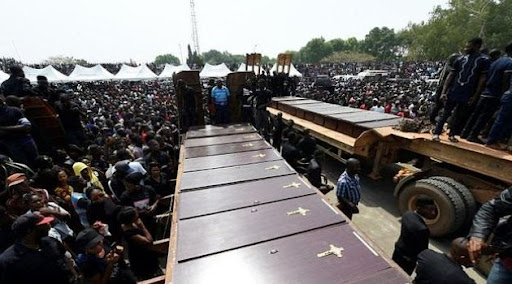Communal Clashes Displace More People In North-central, Northwest Nigeria In 2021 – IOM Report
Amidst worsening insecurity in Northwest and North-central regions, International Organisation for Migration (IOM) revealed that most displacement in 2021 in Nigeria was caused by communal clashes.

Communal clashes took precedence over banditry and kidnapping as the number one cause of displacement of people in eight states in North-central and Northwest Nigeria, a report by the International Organisation for migration (IOM) has shown.
The IOM Nigeria in its Displacement Tracking Index Matrix (DIM) report revealed that 50 per cent of displacement in Northwest and North-central states has majorly been caused by communal clashes, with armed banditry causing 41 per cent of displacement, followed by kidnapping with 5 percent, and natural disaster reporting 1 per cent displacement.
According to the report, Nigeria’s North-central and Northwest geo-political zones have been affected by a multidimensional crisis that has regularly displaced populations in Benue, Nasarawa and Plateau (North-central), and Kaduna, Kano, Sokoto, Katsina and Zamfara (Northwest) States.
“Communal clashes were cited as the reason for displacement by the majority or 50 per cent of the IDPs in North-central and Northwest Nigeria (up from 46% in Round 7). Communal clashes were followed by armed banditry and kidnapping, reported by 41 per cent of IDPs (up from 39% in Round 7), natural disasters, cited by 5 per cent of IDPs (down from 10% in Round 7) and herder attacks in 1 per cent of cases,” the report said.
“The IDPs displaced due to natural hazards were affected mainly by the floods and sandstorms that occurred in Kano State ahead of the previous rounds of DTM assessments. The remaining 4 per cent cited that they were displaced due to the insurgency by Non-State Armed Groups (NSAG) that is currently affecting north-east Nigeria.”
It revealed there were 983,701 IDPs in 159,666 households across the eight states covered in North-central and Northwest Nigeria, representing an increase of 150,695 individuals (or 18 per cent) compared to the 833,006 IDPs identified during the last round of assessments, conducted in July 2021 (Round 7).
Benue State has the highest number of displaced persons with 357,473 (58 per cent per cent) individuals, Katsina hosting 175,510 IDPs has the second-highest number, closely followed by Zamfara with 172,798 IDPs (18per cent of the total IDP population).
Kaduna State has 85,599 IDPs with Zangon Kataf recording an increase in displacement.
Zangon Kataf which recorded the most attacks in the southern part of kaduna had an increase of 6,077 IDPs to a total of 13,248 IDPs by Dec. 2021 due to mass kidnapping and banditry.
In Sokoto State, an estimated 71,289 IDPs were identified, with Isa Local Government Area recording the most significant increase of 3,046 individuals or 58 per cent. The increase in IDP numbers in the LGA resulted from increased attacks and security issues within the respective area.
Kano hosted 26,082 IDPs and was the only state in north-central and northwest Nigeria that hosted more out-of-State IDPs than IDPs originating from locations within Kano.
The report highlighted that in Plateau and Nasarawa states, there was a decrease in displacement after numerous IDPs relocated to their places of residence due to barriers in accessing their farmland and security situation restored in their locations.
The IOM Nigeria report presents information on the numbers, living conditions and needs of displaced populations in the north-central and northwest regions suffering from persistence violence from terror groups.
In a separate report by the International Federation of Red Cross and Red Crescent Societies (IFRC), 2.53 million people from the Northwest region consisting of Zamfara, Sokoto and Katsina are projected to face acute food insecurity.
“Present food insecurity situation is worsened by the closure of borders, insecurity across the region and COVID-19 pandemic. Farmers are unable to access their farms for cultivation which has led to reduction in food production across the region,” the report revealed.
Support Our Journalism
There are millions of ordinary people affected by conflict in Africa whose stories are missing in the mainstream media. HumAngle is determined to tell those challenging and under-reported stories, hoping that the people impacted by these conflicts will find the safety and security they deserve.
To ensure that we continue to provide public service coverage, we have a small favour to ask you. We want you to be part of our journalistic endeavour by contributing a token to us.
Your donation will further promote a robust, free, and independent media.
Donate HereStay Closer To The Stories That Matter




